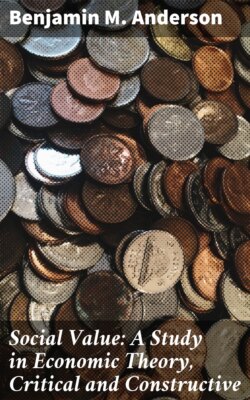Читать книгу Social Value: A Study in Economic Theory, Critical and Constructive - Benjamin M. Anderson - Страница 30
На сайте Литреса книга снята с продажи.
Footnote
ОглавлениеTable of Contents
[1] The value concept of Marx is not, strictly speaking, a social value concept. Cf. Pareto, V., Cours d'Économie Politique, vol. I, p. 32. Rodbertus, however, has a doctrine of social use value, based on the organic conception of society. "Nemlich so: es gibt nur Eine Art Werth und das ist der Gebrauchswerth.... Aber dieser Eine Gebrauchswerth ist entweder individueller Gebrauchswerth oder socialer Gebrauchswerth.... Der zweite ist der Gebrauchswerth, den ein aus vielen individuellen Organismen bestehender socialer Organismus hat.... Damit glaube ich also bewiesen zu haben, dass der Tauschwerth nur der historische Um- und Anhang des socialen Gebrauchswerths aus einer bestimmten Geschichtsperiode ist. Indem man also dem Gebrauchswerth einen Tauschwerth als logischen Gegensatz gegenüber stellt, stellt man zu einem logischen Begriff einen historischen Begriff in logischem Gegensatz, was logisch nicht angeht." From a letter to Adolph Wagner, published by Wagner in the Zeitschrift für die Gesammte Staatswissenschaft, 1878, pp. 223-24. Wagner indicates his approval of this concept, though he makes little use of it, in his Grundlegung der politischen Oekonomie, Leipzig, 1892, pp. 329-30. Ingram, in his History of Political Economy (New York, 1888), although he takes no account of social value theories of other writers, suggests one of his own—which is, however, a vague one, mixing technological, ethical, and economic categories. See p. 241.
[2] Seligman, E. R. A., Principles of Economics, New York, 1905, especially pp. 179-82 and 192-93. Bullock, C. J., Introduction to the Study of Economics, especially pp. 162-64. There is no attempt at a psychological treatment in this work, and no clear statement of the meaning of the concept, social. Kinley, David, Money, New York, 1904, pp. 125-26. The social value conception runs through the book. Merriam, L. S., "The Theory of Final Utility in its Relation to Money and the Standard of Deferred Payments," Annals of the American Academy, vol. III; "Money as a Measure of Value," ibid., vol. IV; an unfinished study in the same volume, pp. 969-72, described by Professor J. B. Clark. Ross, E. A., "The Standard of Deferred Payments," ibid., vol. III; "The Total Utility Standard of Deferred Payments," ibid., vol. IV. These articles by Professors Ross and Merriam were written in the course of an interesting controversy between the gentlemen named, Tuttle, C. A., "The Wealth Concept," ibid., vol. I; "The Fundamental Economic Principle," Quarterly Journal of Economics, 1901.
[3] See chapter XII.
[4] See especially Professor Clark's Essentials of Economic Theory, New York, 1907, pp. 41-42.
[5] See especially The Philosophy of Wealth, 1892 ed., pp. 73-74.
[6] Principles, pp. 179-82.
[7] The general references for Ross and Merriam have been given supra. Cf. p. 62 of Dean Kinley's Money.
[8] "Ultimate Standard of Value." This article is substantially the same as chap, xxiv of The Distribution of Wealth, New York, 1899.
[9] In his discussion of social value in the Principles, Professor Seligman modifies a statement made in his article, "Social Elements in the Theory of Value" (Quarterly Journal of Economics, vol. xv). The two discussions are parallel in part, the former being based upon the latter. The passage quoted is from the Q. J. E. article, pp. 323-24. The same passage is essentially reproduced in the Principles (first edition, p. 180), with the exception of the passages in italics: "I not only measure the relative satisfaction that I can get from apples or nuts, but the quantity of apples I can get for the nuts depends upon the relative estimate put upon them by the rest of society. Some individuals may prize a commodity a little more, some a little less; but its real value is the average estimate, the estimate of what society thinks it is worth. If an apple is worth twice as much as a nut, it is only because the community, after comparing and averaging individual preferences," etc. The conception of social value as an average of individual values is withdrawn in the second treatment, and no substitute is offered for it.
[10] Davenport, "Seligman, 'Social Value,'" Journal of Pol. Econ., 1906; Value and Distribution, Chicago, 1908. This last work reproduces, in abridged form, the article on Professor Seligman, in a footnote, pp. 444 et seq. Schumpeter, "On the Concept of Social Value," Q. J. E., Feb., 1909; "Die neuere Wirtschaftslehre in den Vereinigten Staaten," Jahrbuch für Gesetzgebung, Verwaltung und Volkswirtechaft im Deutschen Reich, 1910, pp. 913 et seq. In the last-named article (p. 925, n.) Professor Schumpeter indicates that his objection to the social value concept relates not so much to the question of fact as to the question of method. The English article in the Quarterly Journal contains Schumpeter's fullest treatment of the topic.
[11] Böhm-Bawerk, "Grundzüge der Theorie des wirtschaftlichen Güterwerts," Conrad's Jahrbücher, N. F., Bd. xiii, 1886, p. 478.
[12] Natural Value, p. 52, n.
[13] Sax, Emil, Grundlegung Der Theoretischen Staatswirtschaft, Vienna, 1887, p. 249.
[14] See supra, p. 3, note 1.
